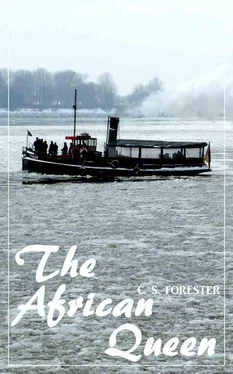‘I have my prayer book here. I can read the service,’ she said, keeping her voice from trembling.
Allnutt came out on the veranda again. His shifty gaze swept the edge of the forest for Germans, before it was directed upon the clearing to find a site for a grave.
‘Just there’d be the best place,’ he said. ‘The ground’ll be light there and ’e’d like to be in the shide, I expect. Where can I find a spide, miss?’
The pressing importance of outside affairs was of such magnitude in Allnutt’s mind that he could not help but say, in the midst of the grisly business—
‘We’d better be quick, miss, in case the Germans come back agine.’
And when it was all over and Rose stood in sorrow beside the grave with its makeshift cross. Allnutt moved restlessly beside her.
‘Come on darn to the river, miss,’ he urged. ‘Let’s get awye from ’ere.’
Down through the forest towards the river ran a steep path; where it reached the marshy flats it degenerated into something worse than a track. Sometimes they were up to their knees in mud. They slipped and staggered, sweating under the scanty load of Rose’s possessions. Sometimes tree-roots gave them momentary foothold. At every step the rank marigold smell of the river grew stronger in their nostrils. Then they emerged from the dense vegetation into blinding sunlight again. The launch swung at anchor, bow upstream, close to the water’s edge. The rushing brown water made a noisy ripple round anchor chain and bows.
‘Careful now, miss,’ said Allnutt. ‘Put your foot on that stump. That’s right.’
Rose sat in the launch which was to be so terribly important to her and looked about her. The launch hardly seemed worthy of her grandiloquent name of African Queen. She was squat, flat-bottomed, and thirty feet long. Her paint was peeling off her, and she reeked of decay. A tattered awning roofed in six feet of the stern; amidships stood the engine and boiler, with the stumpy funnel reaching up just higher than the awning. Rose could feel the heat from the thing where she sat, as an addition to the heat of the sun.
‘Excuse me, miss,’ said Allnutt. He knelt in the bottom of the boat and addressed himself to the engine. He hauled out a panful of hot ashes and dumped them over-side with a sizzle and a splutter. He filled the furnace with fresh wood from the pile beside him, and soon smoke appeared from the funnel and Rose could hear the roar of the draught. The engine began to sigh and splutter—Rose was later to come to know the sequence of sounds so well—and then began to leak grey pencils of steam. In fact the most noticeable point about the appearance of the engine was the presence of those leaks of steam, which poured out here, there, and everywhere from it. Allnutt peered at his gauges, thrust some more wood into the furnace, and then leaped forward round the engine. With grunts and heaves at the small windlass he proceeded to haul in the anchor, the sweat pouring from him in rivers. As the anchor came clear and the rushing current began to sweep the boat in to the bank he came dashing aft again to the engine. There was a clanking noise, and Rose felt the propeller begin to vibrate beneath her. Allnutt thrust mightily at the muddy bank with a long pole, snatched the latter on board again, and then came rushing aft to the tiller.
‘Excuse me, miss,’ said Allnutt again. He swept her aside unceremoniously as he put the tiller over just in time to save the boat from running into the bank. They headed, grinding and clattering, out into the racing brown water.
‘I fort, miss,’ said Allnutt, ‘ ’ow we might find somewhere quiet be’ind a island where we couldn’t be seen. Then we could talk about what we could do.’
‘I should think that would be best,’ said Rose.
The river Ulanga at this point of its course has a rather indefinite channel. It loops and it winds, and its banks are marshy, and it is studded with islands—so frequent indeed are the islands that in some reaches the river appears to be more like a score of different channels winding their way tortuously through clumps of vegetation. The African Queen churned her slow way against the current, quartering across the broad arm in which they had started. Half a mile up on the other bank half a dozen channels offered themselves, and Allnutt swung the boat’s nose towards the midmost of them.
‘Would you mind ’olding this tiller, miss, just as it is now?’ asked Allnutt.
Rose silently took hold of the iron rod; it was so hot that it seemed to burn her hand. She held it resolutely, with almost a thrill at feeling the African Queen waver obediently in her course as she shifted the tiller ever so little. Allnutt was violently active once more. He had pulled open the furnace door and thrust in a few more sticks of fuel, and then he scrambled up into the bows and stood balanced on the cargo, peering up the channel for snags and shoals.
‘Port a little, miss,’ he called. ‘Pull it over this side, I mean. That’s it! Steady!’
The boat crawled up into a narrow tunnel formed by the meeting of the foliage overhead. Allnutt came leaping back over the cargo, and shut off the engine so that the propeller ceased to vibrate. Then he dashed into the bows once more, and just as the trees at Rose’s side began apparently to move forward again as the current overcame the boat’s way, he let go the anchor with a crash and rattle, and almost without a jerk the African Queen came to a standstill in the green-lighted channel. As the noise of the anchor chain died away a great silence seemed to close in upon them, the silence of a tropical river at noon. There was only to be heard the rush and gurgle of the water, and the sighing and spluttering of the engine. The green coolness might almost have been paradise. And then with a rush came the insects from the island thickets. They came in clouds, stinging mercilessly.
Allnutt came back into the sternsheets. A cigarette hung from his upper lip; Rose had not the faintest idea when he had lighted it, but that dangling cigarette was the finishing touch to Allnutt’s portrait. Without it he looked incomplete. In later years Rose could never picture Allnutt to herself without a cigarette—generally allowed to go out—stuck to his upper lip half-way between the centre and the left corner of his mouth. A thin straggling beard, only a few score black hairs in all, was beginning to sprout on his lean cheeks. He still seemed restless and unnerved, as he battled with the flies, but now that they were away from the dangerous mainland he was better able to master his jumpiness, or at least to attempt to conceal it under an appearance of jocularity.
‘Well, ’ere we are, miss,’ he said. ‘Safe. And sound, as you might say. The question is, wot next?’
Rose was slow of speech and of decision. She remained silent while Allnutt’s nervousness betrayed itself in further volubility.
‘We’ve got ’eaps of grub ’ere, miss, so we’re all right as far as that goes. Two thousand fags. Two cases of gin. We can stay ’ere for months, if we want to. Question is, do we? ’Ow long d’you fink this war’ll last, miss?’
Rose could only look at him in silence. The implication of his speech was obvious—he was suggesting that they should remain here in this marshy backwater until the war should be over and they could emerge in safety. And it was equally obvious that he thought it easily the best thing to do, provided that their stores were sufficient. He had not the remotest idea of striking a blow for England. Rose’s astonishment kept her from replying, and allowed free rein to Allnutt’s garrulity.
‘Trouble is,’ said Allnutt, ‘we don’t know which way ’elp’ll come. I s’pose they’re going to fight. Old von ’Anneken doesn’t seem to be in two minds about it, does ’e? If our lot comes from the sea they’d fight their way up the railway to Limbasi, I s’pose. But that wouldn’t be much ’elp, when all is said an’ done. If they was to, though, we could stay ’ere an’ just go up to Limbasi when the time came. I don’t know that wouldn’t be best, after all. ’Course, they might come down from British East. They’d stand a better chance of catching von ’Anneken that way, although ’unting for ’im in the forest won’t be no child’s play. But if they do that, we’ll ’ave ’im between us an’ them all the time. Same if they come from Rhodesia or Portuguese East. We’re in a bit of a fix whichever way you look at it, miss.’
Читать дальше












